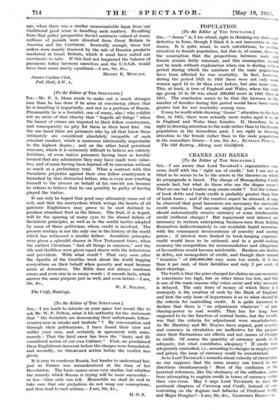CRANKS AND BANKS
[To the Editor of THE SPECTATOR.] SIR,—I am aware that Lord Tavistock's organization eon- cerns itself with the " right use of credit," but I am not so blind as he seems to be to the errors in the theories on which its propaganda is based. The charge of Monopolizing Credit sounds bad, but what do those who use the slogan mean ? That no one but a banker may create credit ? Yet the volume of book debts and trade credit is probably greater than that of bank loans ; and if the creative aspect be stressed, it may be observed that good borrowers are necessary for successful credit creation. That anyone supplying goods or services should automatically receive currency or some irredeemable credit (without charge) ? But repayment and interest are necessary to restrain enterprising business-men from helping themselves indiscriminately to our available liquid resources, with the consequent inconvenience of scarcity and soaring prices ; if interest were limited to book-keeping expenses, credit would have to be rationed, and in a profit-seeking economy the competition for accommodation and allegations of favouritism would become intolerable. Bankers are dealers in debts, not monopolists of credit, and though their annual " taxation " of £90,000,000 may seem too much, it is less than 4 per cent. of their liabilities and only 2 per cent. of their clearings.
The truth is that the price charged for claims on our resources is sometimes too high, but at other times too low, and this is one of the main reasons why crises occur and why recovery is delayed. The only form of money of which there is a monopoly is the creation of cash by the Bank of England, and here the only issue of importance is as to what should be the criteria for controlling credit. It is quite incorrect to declare that there is " no adjustment whatever " of pur- chasing-power to real wealth. That has for long been supposed to be the function of central banks, but the trouble was that the criteria for adjustment were unsatisfactory. As Mr. Hawtrey and Mr. Keynes have argued, gold reserve and currency in circulation are ineffective for the purpose since their fluctuations are effects and not causes of changes in credit.. Of course the quantity of currency needs to be adequate, but what constitutes adequacy ? If credit were adequately controlled, i.e., according to changes in employment and prices, the issue of currency could be unrestricted.
As to Lord Tavistock's remarks about velocity of circulation, no one supposes that the same money can travel in two directions simultaneously ! Most of the confusion of the heretical reformers, like the obstinacy of the orthodox, arises from attempting to explain credit in terms of currency rather than vice-versa. May I urge Lord Tavistock to read the pertinent chapters of Currency and Credit, instead of con- centrating on the dogmas and fallacies of Professor Soddy and Major Douglas ?—I am, Sir, &c., GEOFFREY BIODULI'll.














































 Previous page
Previous page